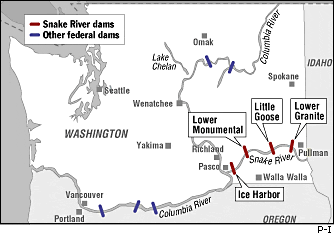forum
library
tutorial
contact

Administration May Be Putting Off
Dam-Breaching Ruling
by Robert McClure
Seattle Post-Intelligencer, April 20, 2000
|
the film forum library tutorial contact |

|
Administration May Be Putting Off
by Robert McClure
|
The Clinton administration appears to be ducking the most contentious issue in the salmon-rescue debate -- dam breaching -- until after the November election.
A decision on whether to restore Southeast Washington's Snake River by disabling four dams "will not -- and should not -- be made on my watch," Clinton's Interior secretary, Bruce Babbitt, told Washington Sen. Slade Gorton earlier this month.
And this week, the National Marine Fisheries Service said it will not make a recommendation in late spring, as previously expected.
Meanwhile, a high-ranking Army Corps of Engineers official said in congressional testimony last week that postponing a decision on the dams until after the election "is a distinct possibility."
This week, a Corps spokeswoman promised a tentative recommendation "in the October-November time frame," leaving enough wiggle room that the announcement could come after Al Gore faces George W. Bush on Nov. 7.
The Corps of Engineers was to show the Clinton administration's hand last December, but the agency unexpectedly balked and made no recommendation.
Yesterday, The Washington Times reported that the corps had been prepared to recommend leaving the dams in place, but senior officials in the Department of Defense ordered that recommendation erased. A Senate task force has begun an investigation, the newspaper said.
"It's greatly disturbing," said Gorton spokeswoman Cynthia Bergman, who accused the administration of "suppressing scientific evidence to further their political agenda."
In an Oct. 22 memorandum obtained by the Seattle Post-Intelligencer, Joseph Westphal, assistant secretary of the Army, decreed that "The Army does not at this time have a preferred alternative" on dam-breaching. He ordered two chapters of the draft recommendation removed.
 The four dams on the lower Snake turned what was once a
free-flowing, cool river into a series of warm, somewhat stagnant
ponds, thus killing salmon as they migrate.
The four dams on the lower Snake turned what was once a
free-flowing, cool river into a series of warm, somewhat stagnant
ponds, thus killing salmon as they migrate.
But the dams bring economic benefits: low-cost transportation to market for goods such as wheat and timber products and about 5 percent of the Northwest's electricity. One dam provides water for 13 farms.
Breaching the dams -- punching holes in their earthen flanks to allow the river to flow freely -- would make the river too shallow for barges. More-expensive truck or railroads would be required.
Environmentalists, Indian tribes, and sport and commercial fishermen are virtually unanimous in calling for the dams' demise. Lining up in the dams' defense are agriculture interests, most Southeast Washington residents and high-ranking politicians.
The emerging picture of the administration's handling of this critical decision is one of disarray.
"It looks like the left hand doesn't know what the right hand is doing," said Chris Zimmer of Save Our Wild Salmon, an environmental group.
Although a cost-benefit analysis apparently swayed the corps away from dam-breaching, a U.S. Fish and Wildlife Service regional administrator called breaching "a no-brainer" when biology is concerned.
And a third agency involved, the National Marine Fisheries Service, has abandoned plans to issue a recommendation in May or June.
"It's highly unlikely we would make a decision this year," said Brian Gorman, a spokesman for the fisheries service. "We simply don't have enough science."
The federal government had promised, as a result of a lawsuit filed by environmentalists in the mid-1990s, to make a decision in 1999. Then the fisheries service planned a recommendation by late this spring.
Gorman compared federal scientists to emergency-room doctors. In some cases, they face a patient so badly hurt they must make instant decisions without waiting for diagnostic work such as blood tests.
"We're not in that situation now," he said. "We have time to let the patient recover enough so that when we do make our decision, it's going to be the right one.
"We don't know yet if the dams must be breached in order to avoid extinction."
Environmentalists, meanwhile, are getting a different story.
"Administration officials I talked to bristled at the notion that they are punting," said Scott Bosse of Idaho Rivers United. "This administration over the last 7 1/2 years has such a pitiful history of delaying any meaningful action that it's hard to believe."
It is a tough issue for Gore, who has presented himself as the administration's leading environmentalist. But he needs the labor vote to win.
Labor solidly backs the dams. And the Washington State Labor Council, AFL-CIO, represents about 460,000 workers.
Faced with this divide between two core constituencies, Gore apparently has decided not to decide. "Gore's got the nomination without taking this position," said Bruce Lovelin of the Columbia River Alliance, which represents dam-dependent businesses. "Why the hell's he going to take this position now? He's not."
Lovelin said he wonders what might happen if Bush -- who is against breaching -- triumphs. Might there be a "rush to judgment" in the final days of a Clinton presidency?
Another important factor could change in the election: Gorton. The most powerful congressional opponent of dam-breaching, has been targeted by Democrats, who view him as vulnerable.
Today, Gorton convenes what has been called a "salmon summit" at the Redmond VFW Hall, 4330 148th Ave. N.E., to hear from local and state officials and tribal leaders on salmon-recovery efforts. The meeting runs from noon to 5 p.m.
But earlier this week, Gorton made it clear he will not waiver. "As long as I'm a U.S. senator, no proposal to breach Snake River dams will pass in Congress."
learn more on topics covered in the film
see the video
read the script
learn the songs
discussion forum
